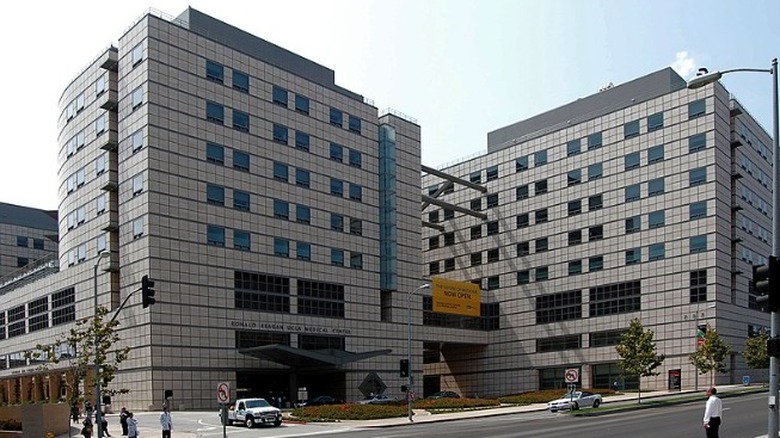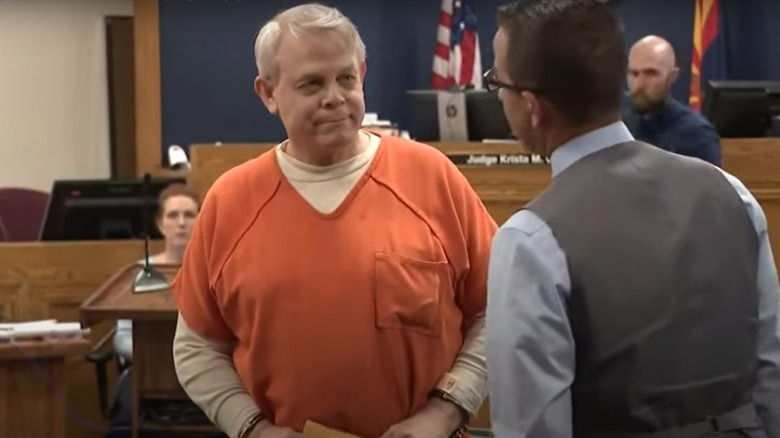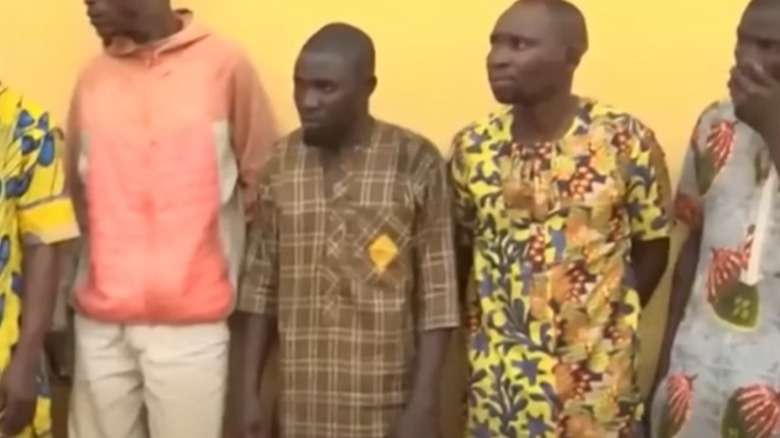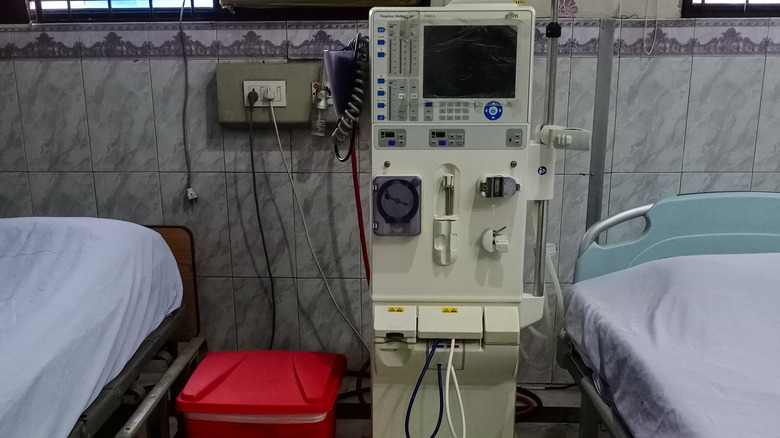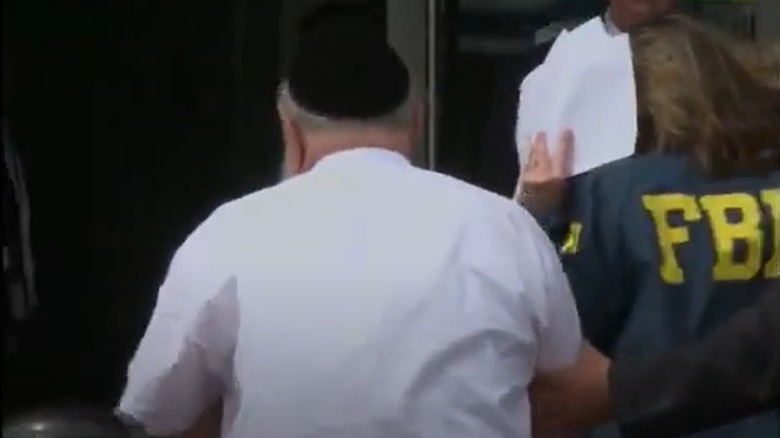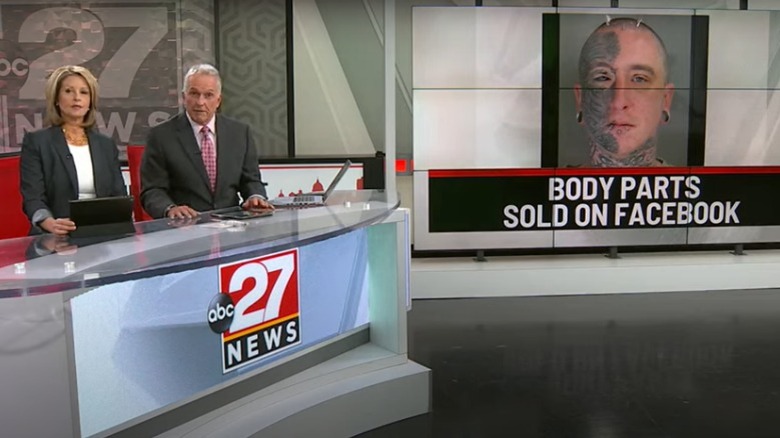People Who Got Into Big Trouble For Selling Body Parts
In the 1700s, doctors became increasingly interested in obtaining human cadavers for medical training and research, which meant relying on grave robbers to supply illegal corpses for dissection. These days, awareness of the need for cadavers and organs for transplants has led to greater willingness to donate both during life and after death. However, there are still shortages, and the illegal sale of cadavers and organs has become a serious problem in the United States and elsewhere. Angela McArthur, who oversees the donation of cadavers at the University of Minnesota Medical School said, "The current state of affairs is a free-for-all ... I don't know if I can state this strongly enough. What they are doing is profiting from the sale of humans."
As reported by Reuters, so-called "body brokers," who arrange for the sale of cadavers to medical and research facilities, often target the disadvantaged, and offer money to families who agree to donate their family member's remains. As reported by Knowledge at Wharton, in some cases, the remains are sold without the families' consent.
The illegal trade of transplant organs is another serious concern. Kidneys, which can be harvested from living donors, are the most common organs illegally traded and transplanted. Global Financial Integrity reports these organ brokers also target poorer people, who are coerced to part with a kidney for money.
Fortunately, sometimes the criminals who do these heinous things get caught and punished. Here are people who got into big trouble for selling body parts.
Arthur Rathburn sold diseased body parts
In 2013, the Federal Bureau of Investigation raided a Michigan corporation owned and managed by Arthur and Elizabeth Rathburn. According to the United States Court of Appeals for the Sixth Circuit, International Biological, Inc. purchased cadavers and organs from different sources and rented them to medical professionals, who then used them for training.
Although the rental of human cadavers and organs is generally legal for medical training purposes, Arthur failed to disclose many of the remains he provided were diseased. According to the Sixth Circuit Court, all of the specimens IBI received were from reputable companies, which provided clearly marked, detailed information about the donors — including that some of them tested positive for hepatitis, HIV, and other infectious diseases. However, Arthur and Elizabeth didn't bother giving that information to those who rented cadavers and organs from him. He also provided his customers with a contract, which implied the organs were tested and found negative for the very diseases some actually had.
As reported by the Chicago Tribune, Arthur was also accused of deceiving the families of the deceased. Although the families agreed that their loved ones' remains could be used for medical training, they expected them to be cremated and the ashes returned when the training was complete. Instead, Arthur often kept certain parts and only returned partial remains to the families. Arthur Rathburn was ultimately convicted on several charges and sentenced to nine years in prison.
Funeral directors sold body parts without families' consent
Between 2010 to 2018, mother and daughter Shirley Koch and Megan Hess operated the Sunset Mesa Funeral home (pictured). As reported by CNN, the Montrose, Colorado, mortuary provided cremation services. However, Hess and Koch also had a macabre side business, which involved selling organs, and sometimes entire cadavers, without the families' consent.
As stated in a press release, the United States Attorney's Office for the District of Colorado said some families consented to small tissue samples being removed and donated for medical research prior to cremation. However, in many instances, Hess and Koch removed more than was previously agreed and sold the tissue, pocketing the cash. They also sold organs or whole bodies without families' knowledge. But how did they give the families the cremains when the body hadn't been cremated at all? They simply lied about what ashes the families were given. Authorities estimate the remains of hundreds of people were mishandled.
Some of the organs and tissues Hess and Koch sold were diseased — they lied to the buyers, certifying that the parts had been tested and determined to be free from any infectious diseases. As the diseased organs were sent through the mail, the women violated Department of Transportation safety regulations. Per a plea agreement, Hess and Koch both pleaded guilty to one count of mail fraud and aiding and abetting. The Attorney's Office reports Hess was ultimately sentenced to 20 years in prison and Koch was sentenced to 15 years.
UCLA medical school director made $1 million selling body parts
Between 1999 and 2004, Harry Reid, the director of UCLA medical school's Willed Body Program, made an estimated $1 million selling donated cadavers and organs harvested from cadavers. CBS news reports Reid sold the remains directly to Ernest Nelson, who then sold the cadavers and organs to drug, medical, and scientific research companies.
Families who donated their loved one's remains to the Willed Body Program had specific expectations according to the contracts they signed with university officials. According to the contracts, the remains would be used by the university exclusively and would never be sold. The families were also assured the remains would eventually be cremated and returned to them upon request.
UCLA attorney Louis Marlin said the college was made aware of irregularities concerning the sale of organs and cadavers when they were contacted by the California Department of Health. As reported by CNN, the California Department of Health received reports that Nelson, who sold and facilitated the transport of the cadavers and organs, was selling tissue that had not been tested for infectious diseases. They also revealed Nelson purchased the cadavers and organs from Reid.
CBS News reports Reid pleaded guilty to one count of conspiracy to commit grand theft per a plea agreement. He also admitted to damaging or destroying $1 million worth of cadavers, which were considered school property. In addition to a sentence of more than four years in prison, Reid was ordered to pay restitution.
'Body broker' Walter Harold Mitchell III was charged with 29 counts
In December 2020, a man in Prescott, Arizona, made a grisly discovery while hiking through the high desert. Scattered on the ground, among the brush, he found multiple pieces of blue fabric wrapped around what appeared to be dismembered human remains. 12 News reports when authorities arrived on the scene, they confirmed a total of 24 body parts were dumped throughout the area. The following day, a hunter contacted authorities to report he found a human skull in a ditch approximately 50 miles outside of Prescott. Crime scene technicians scoured the area and eventually found a total of five skulls, among other human remains.
AZCentral reports tags found on some of the body parts led authorities to a company called Future Genex, which was owned and operated by Walter Harold Mitchell III. Through Future Genex, Mitchell provided cadavers and organs to medical training and research facilities for 30 years. However, when he closed his business, he simply discarded the remains he still had in his possession. In addition to the parts found dumped in the desert, 12 News reports he left some remains in a freezer, which he sold.
Mitchell was ultimately convicted on 29 counts of abandonment or concealment of a dead body. King5News reports he was sentenced to six years and three months in prison. However, it is unclear how many other crimes he may have committed in the course of his 30-year business.
Eight people kidnapped and killed a woman for her body parts
On December 29, 2022, authorities in the Obalende neighborhood of Lagos, Nigeria, received a call from Ojo Omolara, who was concerned for the safety of her neighbor Oyindamola Adeyemi. As reported by Nigerian Tribune, Adeyemi left home on the morning of December 28, and had not returned as expected. Omolara was specifically concerned, as Adeyemi was not answering her phone and had not returned Omolara's calls. Later that same day, law enforcement officials confirmed Adeyemi's dismembered body was found along the side of the road.
In the course of their investigation, authorities tracked the location of Adeyemi's cell phone to herbalist Taiwo Olutufese Ajalorun. A subsequent search of Ajalorun's home revealed he was in possession of a container of what appeared to be blood. Later testing confirmed the blood was human and belonged to Adeyemi. Ajalorun eventually led authorities to another man, Lukman Oladele, who was an accomplice.
Nigerian Tribune reports Ajalorun and Oladele both admitted to luring Adeyemi to the home of Taiwo Olutufese, with the express purpose of killing her, dismembering her body, and selling the parts. Prior to their arrest, the men had already sold Adeyemi's head, legs, and heart. They also confessed they had previously killed two other people for the express purpose of selling their body parts. A total of eight people were ultimately arrested in the kidnapping and death of Adeyemi, as well as the sale and purchase of her body parts.
People were charged with finding victims on Facebook and harvesting their kidneys
On September 30, 2020, several civilians in Cairo, Egypt, attacked and detained four individuals, who they believed were responsible for the kidnapping of a young girl. As reported by Egypt Today, authorities were eventually called to the scene, where the accused kidnappers were taken into custody.
During interrogation, the four suspects did not admit to kidnapping anyone. However, they did confess to recruiting organ donors via social media sites, including Facebook. According to Egypt Today, the suspects offered donors the equivalent of $812 per kidney and forced them to sign an agreement stating they would follow through with the organ removal surgery once they committed to do so. The harvested organs were then sold to people in need of kidneys, who were also recruited via social media, for the equivalent of $3,249 to $4,874.
It is unclear how many people were recruited to sell their kidneys or whether they all survived the removal of their organs.
An organ trafficking ring removed a kidney from a missing boy
Authorities in Pakistan were searching for a missing boy when they stumbled on a terrifying organ trafficking ring run by a gang in Punjab. As reported by CBS News, the 14-year-old boy was eventually tracked to an underground laboratory in Rawalpindi, where he was recovering from an illegal and unauthorized operation to remove one of his kidneys.
In the course of their investigation, authorities determined the boy was the victim of organ traffickers. During an interview, the boy told law enforcement officials he woke up after his kidney was removed to find another man, who he believed to be of Arab descent, laying on a stretcher next to him. Punjab police spokesman Rehan Anjum said the boy's statement led authorities to believe "most of the clients were foreigners." Law enforcement officials said the gang members specifically targeted disadvantaged people and youths, who they knew they could mislead by offering them employment or large sums of money. Instead, the victims were taken to the makeshift laboratory, where their kidneys were removed without their consent. CBS News reports the organs were then sold for the equivalent of $4,000 each.
Although six people were ultimately arrested on charges relating to the organ trafficking ring, none of the doctors or surgeons, who actually performed the surgeries, have been apprehended.
Doctors in India were arrested for an extensive organ trafficking scheme
Between 1997 and 2002, authorities in Amritsar city, India, estimate members of a local organ trafficking ring participated in as many as 1,552 unlawful kidney removal and transplant operations. India's Transplantation of Human Organs Act prohibits the sale of organs for profit. Although donations are allowed, the donations must be made by a relative or someone similarly close to the recipient.
As reported by the National Library of Medicine, the presumed leader of the scheme was Dr. Parveen Kumar Sareen. Law enforcement officials said Sareen was a transplant specialist at Kakkar Hospital, where the unlawful surgeries were performed. Along with Sareen, authorities arrested a number of other doctors and middlemen, as well as some of the donors. One of the more notable participants in the scheme was Dr. O. P. Mahajan. According to the National Library of Medicine, Mahajan served as the head of a Government Medical College committee, which was responsible for ensuring organ donations were handled lawfully.
Sareen, Mahajan, and the others were accused of specifically targeting disadvantaged people, who were offered as little as $500 per kidney. The organs were then sold to recipients for a hefty profit. The organ traffickers were also accused of failing to provide some of the donors with vital aftercare. The Natural Library of Medicine reports at least six people were confirmed to have died following the removal of their kidneys.
New Jersey rabbis and government officials were part of organ trafficking ring
In July 2009, New Jersey authorities arrested 44 members of an alleged crime ring, who included elected officials, government appointees, and at least five rabbis. As reported by Reuters, the arrests were part of a widespread investigation that lasted a decade. In addition to money laundering and political corruption, the suspects were accused of trafficking human organs. Levy Izhak Rosenbaum, who was identified as a participant in the crime ring, was accused of facilitating the purchase and sale of human kidneys. Acting U.S. Attorney Ralph Marra said, "[Rosenbaum's] business was to entice vulnerable people to give up a kidney for $10,000 which he would turn around and sell for $160,000."
CBS News reports Rosenbaum ultimately pleaded guilty to purchasing kidneys from three people, who were living in Israel. He then facilitated the transport of the organs to the United States, where they were transplanted into patients in need of a kidney. According to Rosenbaum's attorney, Edward Schulman, the donors and recipients were aware of the details of the process and consented to participate. Schulman argued that although his client's brokering of kidneys was illegal, he likely saved lives.
Although authorities have reason to believe Rosenbaum purchased and sold a larger number of kidneys, he was offered a plea deal. In exchange for his admission of guilt in the purchase and sale of three kidneys, Rosenbaum was sentenced to around two years in prison. He was released in 2014.
Jeremy Lee Pauley planned to sell body parts via Facebook
Jeremy Lee Pauley never denied having a fascination with "oddities," which included skeletal human remains. As reported by CBS News, his personal collection of bones, which included several complete skeletons, was obtained legally from legitimate sources and was displayed throughout Pauley's home. However, Pauley's apparent obsession with human remains eventually developed into something far more disturbing and illegal.
Authorities were alerted to the issue when they saw Pauley's Facebook page. CBS News reports the page was titled, "The Grand Wunderkammer," and Pauly was clearly listed as the owner of the page. In addition to advertising his services providing "guest lectures" and "live entertainment," Pauly provided a link to his website, where he offered to sell human bones and other body parts. The Facebook page also included photos of human bones.
During a subsequent search of Pauley's home, ABC 27 reports authorities found several containers filled with human body parts, including brains, livers, lungs, a heart, and various other bones and organs. They also discovered several packages of human body parts and organs, which were mailed to Pauly by an Arkansas woman named Candace Scott. Law enforcement officials said Scott unlawfully obtained the parts from the mortuary where she worked.
Pauley was ultimately arrested and charged with the abuse of a corpse, receiving stolen property, and receiving and sending money for illegal activities. He was released on $50,000 bond and was awaiting trial as of 2023.



